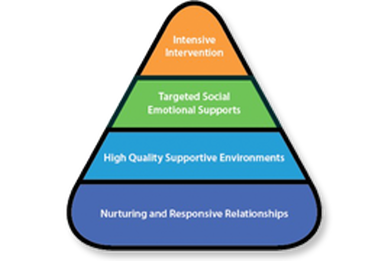POSITIVE BEHAVIORAL INTERVENTIONS
"No significant learning occurs without a significant relationship.”
- JAMES COMER
|
Columbia Child Development Program uses "Positive Behavioral Interventions & Supports (PBIS)" which is a way to reduce challenging behaviors by increasing desirable behaviors through prevention, positive consequences, and teaching appropriate behaviors. PBIS is a highly effective intervention approach.
|
The basis of PBIS follows the "Teaching Pyramid", which includes four levels of practice to address the needs of all children. This is a model for supporting social competence and preventing challenging behavior in your children.
The foundation of PBIS is to build supportive relationships; included in this are children, teachers, and parents. Good relationships are the key to effective teaching and guidance in social, emotional, and behavioral development.
Secondly, the staff implement preventive practices in the classroom. The staff give children positive attention for their pro-social behavior and teach them classroom routines and expectations. The staff insure that the daily activities encourage and support children's engagement.
Secondly, the staff implement preventive practices in the classroom. The staff give children positive attention for their pro-social behavior and teach them classroom routines and expectations. The staff insure that the daily activities encourage and support children's engagement.
Thirdly, the staff use social and emotional teaching strategies. Children learn to identify their feelings and act upon their feelings in an appropriate way.
Lastly, staff plan intensive individualized interventions for some children. A team works together to create a plan to help the child gain skills to succeed in the classroom based on the identifying factors related to the child's challenging behavior.
Successful implementation of PBIS insures a high quality early education experience in the classroom and at home.
Lastly, staff plan intensive individualized interventions for some children. A team works together to create a plan to help the child gain skills to succeed in the classroom based on the identifying factors related to the child's challenging behavior.
Successful implementation of PBIS insures a high quality early education experience in the classroom and at home.
What is PBIS?
- PBIS helps create relationships with families, staff and children in a positive way!
- PBIS intentionally teaches social skills and provides behavior supports when needed.
- PBIS also identifies and helps understand challenging behaviors in children and helps children learn new skills to replace challenging behaviors.
How is PBIS used in the classroom?
- Stories that teach children how to get along with others, how to express their feelings and how to solve problems are read to the children.
- Picture schedules are reviewed and posted in the classroom so children know what is coming next.
- Quiet areas in classroom to help children calm down.
- Positive comments and praise given to children for positive behavior.
How will PBIS benefit my child?
- Will help child learn how to play with others.
- Will help child recognize and express his/her own feelings.
- Will help child develop problem solving skills.
- Will help child learn how to calm down.
For additional information about PBIS, please visit the Center on the Social & Emotional Foundations for Early Learning
"A word of encouragement during a failure is worth more than an hour of praise after success.”
- UNKNOWN
Columbia Child Development Program
Child Care 570-784-8618 Head Start 570-784-1076
Child Care 570-784-8618 Head Start 570-784-1076
This website is supported by Grant Number 03CH011608 from the Office of Head Start within the Administration for Children and Families, a division of the U.S. Department of Health and Human Services. Neither the Administration for Children and Families nor any of its components operate, control, are responsible for, or necessarily endorse this website (including, without limitation, its content, technical infrastructure, and policies, and any services or tools provided). The opinions, findings, conclusions, and recommendations expressed are those of Columbia Child Development Program and do not necessarily reflect the views of the Administration for Children and Families and the Office of Head Start.

